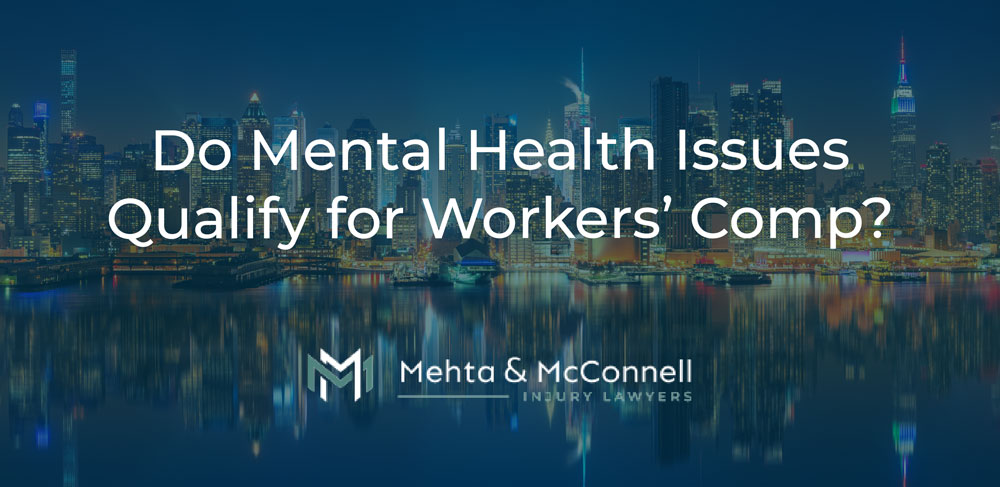
Mental illnesses such as post-traumatic stress disorder (PTSD), anxiety, or depression make dealing with the daily difficulties of life a struggle.
Our lawyers understand that it can be even more challenging if you develop these mental health concerns at work.
These conditions are often experienced on the job by firefighters, police officers, and first responders, among others.
You might be asking yourself “Do mental health issues qualify for workers’ comp”? The answer is yes, but you will have to meet specific requirements.
In a nutshell, workers’ compensation for mental health concerns depends on the circumstances of how your condition is related to your work.
For more information, reach out to our attorneys at Mehta & McConnell, PLLC, today.
What Is Workers’ Compensation?
Workers’ compensation allows employees to recover for injuries and illnesses they sustained in the course and scope of their employment.
This insurance coverage typically covers your lost wages and medical expenses due to your injury or illness.
Workers’ compensation varies by state, so don’t rely on general statements you might find online. Instead, check the requirements and deadlines specific to North Carolina for additional details.
For example, North Carolina has 600 employer classifications. The classification of your employer will alter the rates your company can receive.
Can I Recover Workers’ Compensation for PTSD?
PTSD is a mental health issue caused by a severely traumatic event such as assault or threatened death. If you experienced PTSD due to your job, you might be eligible to receive compensation through workers’ comp.
This injury may not be as easily noticeable as a physical injury, but it can harm a person’s ability to perform their job.
One illustration of an employee suffering PTSD during their employment might be a police officer who is in a shooting. Other examples might include a firefighter witnessing a terrorist attack or car accident.
What Are the Requirements for First Responders?
Under the recently enacted House Bill 492, first responders can receive workers’ compensation if they have PTSD. To be eligible, you need to meet the following requirements:
- You must be a 911 dispatcher, law enforcement officer, or another first responder as defined in the bill;
- You must have had a medical provider diagnose you with PTSD; and
- The healthcare provider must determine that activities of your employment caused it.
For further information on how you can file your claim for benefits, contact our experienced attorneys.
What Are the General Requirements?
You may also be able to recover workers’ compensation under the “catch-all” provision for occupational diseases under North Carolina law. There are two requirements to qualify for this:
- Your employment must have placed you at an increased risk compared to the overall population’s risk, and
- The job substantially contributed to your occupational disease.
This applies to PTSD and other mental illnesses, even though the statute does not list them by name.
What Are the Symptoms of PTSD?
There are various potential symptoms of PTSD that you should watch out for. If you are exhibiting these symptoms and believe you might have PTSD, consider reaching out to a healthcare professional.
Our lawyers can then work with you to help you file your workers’ compensation claim. Some possible symptoms of this condition involve:
- Being easily startled,
- Experiencing nightmares,
- Difficulty concentrating,
- Difficulty falling asleep,
- Having angry outbursts, and
- Having flashbacks.
Our attorneys are here to assist you if you plan to file a workers’ compensation claim due to PTSD. We can also help you to file an appeal if necessary. At Mehta & McConnell, we are here to fight for you every step of the way.
Am I Eligible for Workers’ Compensation for Anxiety?
You can recover workers’ compensation for anxiety in North Carolina. This can assist you with medical bills or lost wages caused by your mental health condition. You will need to meet the requirements in the “catch-all” provision, as noted above, to qualify.
One example is if you have suffered from stress as a 911 dispatcher and developed severe anxiety as a result.
Another possible cause of anxiety developing on the job might include repeated incidents of harassment by coworkers.
Anxiety claims are tricky because you will have to establish a connection between your workplace environment and the anxiety you suffered.
In other words, you have to show that your specific job—as opposed to working in general—caused your anxiety.
Working with mental health professionals and a North Carolina workers’ comp attorney will almost certainly be necessary for you to succeed.
What Are Some Symptoms of Anxiety?
You will first have to have a diagnosis of an anxiety disorder to be eligible for workers’ compensation. However, the following symptoms may suggest that you should seek a professional diagnosis:
- Anxious thoughts that are difficult to control,
- Avoiding daily activities that you used to participate in,
- Dizziness or a pounding heartbeat, or
- Shortness of breath.
If you believe you may have anxiety as a result of job-related functions, you should reach out to a medical provider who can diagnose you.
Our attorneys can then help you to file your claim for workers’ compensation so that you can receive benefits.
Can I Receive Workers’ Compensation Due to Depression?
As with PTSD and anxiety, you may also be able to recover workers’ compensation benefits as a result of experiencing depression.
In the same way, as with the other conditions listed, you must meet the requirements of the “catch-all” provision.
One example of a scenario that may cause depression is a paramedic who repeatedly exposes themselves to death. A police officer may also be at risk of developing depression due to the constant physical threats involved.
Employees in other professions, such as teachers and retail workers, may also qualify for workers’ compensation coverage.
But as with other mental health conditions, depression claims can be challenging to prove for workers who are not first responders.
Again, it is absolutely essential to show that the unique circumstances of your particular employment caused your depression in a way not experienced by the general workforce. You will need a workers comp lawyer to help you do this.
If you have any questions regarding how you can qualify or how to file your claim, consider reaching out to our knowledgeable lawyers.
Depression compensation payouts may vary due to your situation. At Mehta & McConnell, we can help you recover the benefits you deserve.
Common Signs of Depression
If you think you may be suffering from depression, it is crucial to your claim that you call a professional. This might be an experienced psychiatrist or psychologist in your area.
They can help diagnose you so that you are able to qualify for workers’ compensation coverage. Remember that you will have to prove that you experienced your mental health condition in the course of your employment.
Some signs of depression could include:
- A lack of appetite or overeating,
- Feeling hopeless or irritable,
- Headaches or cramps,
- A loss of interest in certain activities, or
- Thoughts of suicide or death.
If you are interested in filing a workers’ comp claim for depression, you can potentially recover benefits. Contact our lawyers today, and we can provide you with further details.
Can Stress Qualify for Workers’ Compensation?
Plenty of employees can experience intense stress. Nonetheless, if you begin to exhibit one of the diagnosed conditions noted above, you might be able to receive compensation.
The benefits you may receive under workers’ compensation can vary depending on your circumstances. Due to all the variables involved, there is not necessarily an average payout for stress at work.
Like depression and anxiety, stress can be a challenging claim to prove in a workers comp context. There must be something about your job—not typical of the average workplace—that caused you to develop stress and resulted in your inability to work.
Given these conditions, it is vital to talk to a knowledgeable workers’ comp attorney before filing your claim.
What Benefits Can I Receive Under Workers’ Comp?
You can receive several potential benefits if you file a timely claim.
Lost Wages and Medical Bills
As with physical injuries, you can recover for lost wages and medical expenses under workers’ compensation.
You might be able to recover lost wages if you had to take time off of work due to your mental health condition. Medical expenses might include medication or the cost of visits to a psychiatrist or psychologist for treatment.
Disability Benefits
You may also qualify for disability benefits under workers’ compensation insurance coverage. The different disability categories for benefits purposes are as follows:
- Temporary Partial Disability (TPD),
- Temporary Total Disability (TTD),
- Permanent Partial Disability (PPD), and
- Permanent Total Disability (PTD).
If you have questions about which category you may fall under, reach out to our accomplished attorneys.
How Our Lawyers Can Help You
If you have suffered from a mental health issue on the job, contact our lawyers at Mehta & McConnell.
We can help you obtain workers’ compensation for depression and anxiety, among other conditions.
If they deny your claim, our lawyers can advocate for you and assist you in filing an appeal. Our skillful attorneys have over 30 years of combined experience and are ready to help you.
Feel free to call us today at 980-446-3301 or fill out our online form for a free consultation.
